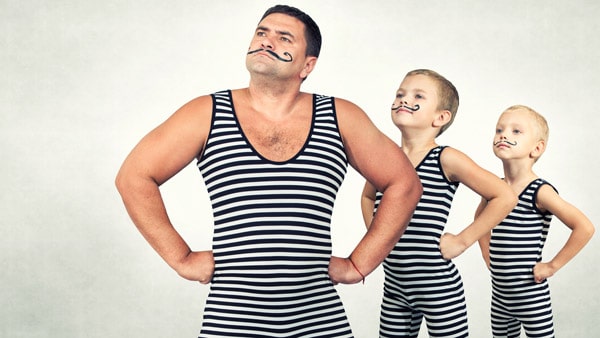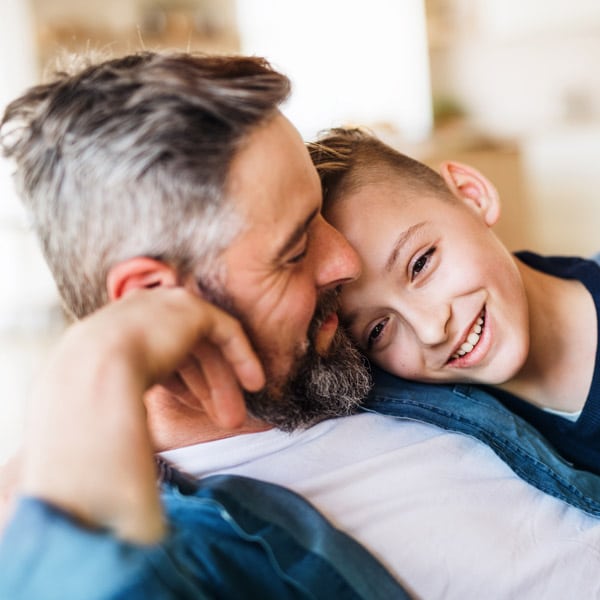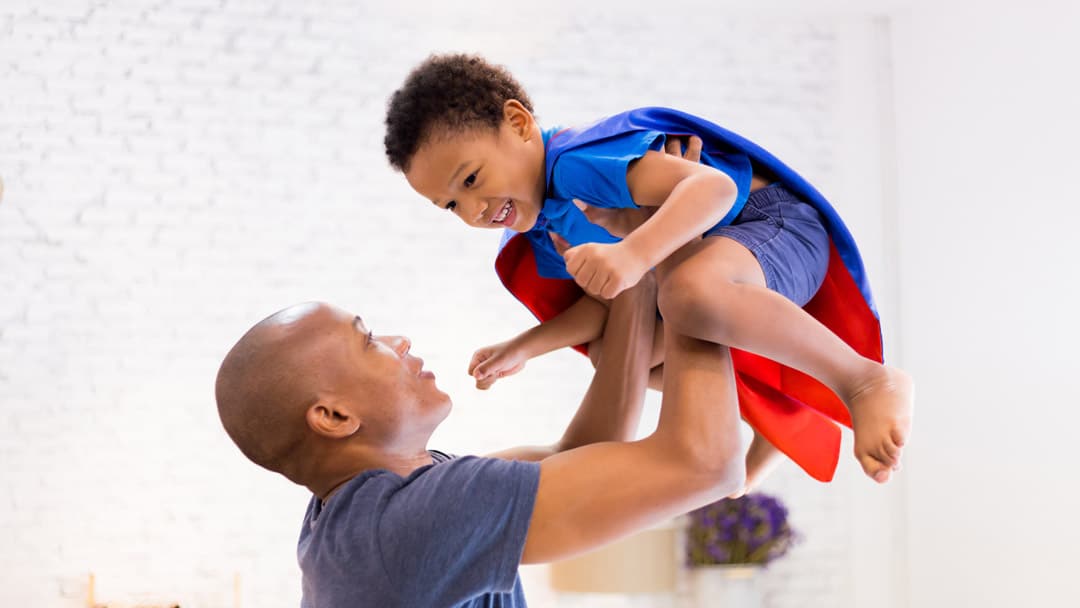Many fathers or fathers-to-be can relate to the nervous excitement that comes with having kids. Some of us can admit that we were scared about becoming dads and questioned whether we’d be any good at it.
Take Bruno, Mike and Armand, for example, who have known each other since they were kids. Bruno watched Mike become a father of two daughters, and Armand has a daughter and a son. Now it’s his turn to step into the wonderful world of parenthood. As much as he’s excited, he knows that parenting isn’t all wonderful.
After Bruno’s first child is born, he confesses to his friends that he’s scared sh*tless of becoming a dad. He didn’t have a good relationship with his dad, which he jokingly blames on the phone company. You know, because they never had a good connection.
Mike feels the same way. His father wasn’t around much when he was a kid and wasn’t a great role model. For Armand, it’s the opposite; he couldn’t wait to have kids, and he was comfortable becoming a dad. Armand’s dad was close to him, and both Bruno and Mike wished they had a dad like that.
Bruno and Mike are worried because how men act as fathers is often shaped by the relationship they had with their own fathers. However, the truth is that history doesn’t have to repeat itself. They can break the pattern and have a positive impact on their kids, especially by being actively involved.
Whether you had a good relationship with your dad or not, what the men are asking is, what does it mean to be a good dad? How can I be a good role model for my kids?
Here are ways you can be a great role model and get more connected with your kids:

Make time for them
There is no substitute for time spent with your kids, especially when they have your undivided attention. In this instance, quality comes with quantity. Try to make time to connect every day.
In our busy lives, it may be a challenge to spend time with our children on a daily basis. For Bruno, that might mean making time to hold his son every day, helping to feed him, changing his diaper, or going for a walk while holding him in a baby carrier.
For Mike and Armand, it could be playing “let’s pretend,” getting active with sports activities, doing chores around the house, reading to them, and/or running errands together. Try committing 15 to 30 minutes every day to spend time with your kids doing something they want to do.
Be honest with your emotions
As a father, this may be one of your bigger challenges. How did your parents express their emotions when you were a kid? Especially your father? How were anger, sadness, disgust, joy and excitement expressed?
All of our emotions serve a purpose. For many sons, the most common emotion they witnessed was anger. In fact, for many people, anger was the only acceptable emotion that their fathers expressed. Did you ever see your father cry? Have you ever cried in front of your children? Be honest about your own emotions.
Anger has its place
Anger is a very important emotion. It can serve us well; it can also cause a lot of hurt. When you’re angry, check yourself first by asking a few questions. What’s the cause of my anger? How do I want to express it? Do I really want to be this angry with my child?
Remember, you’re the role model. Negative or hurtful memories can have a longer and stronger lifespan than positive memories. Hurtful ones stick like Velcro, and positive ones can slip away like eggs on Teflon.
Time outs aren’t just for kids
If your anger toward your kid might make you say something you’ll regret later, show them your respect by taking a time out. Tell them that you’re very angry and upset, that you don’t want to yell at them and that you need a minute or two to “collect yourself.”
Later, when you speak to your child, separate what they did from who they are. Be sure to make it clear to your child that you don’t think they’re a bad person. As an example, Instead of telling them that they’re a disrespectful child, you can say that they acted in a way that was disrespectful towards someone else.
Give yourself and your kids permission to be sad
If being sad includes tears, “go with the flow.” The tears will stop eventually. If your kid seems anxious or unsettled when you shed a tear or two, assure them that you’ll be alright. Explain what it is that’s making you sad.
Usually, after crying, we think more clearly. Be careful not to embarrass or shame your kids for crying. Give them assurance that life will go on. And it will.
Celebrate positive experiences and accomplishments with praise
When you praise a child, it helps them come to know themselves, their skills, their values, and their strengths. Sometimes parents worry that giving their kids too much praise will give them a ‘big head’, but this simply isn’t true.
A part of praising accomplishments is also to let your children know that you always have their back even if they’re struggling or failing at something. Be there for them during the highs and the lows.
Give kids space to become who they are
Focus groups were conducted across Canada after the pandemic started asking fathers what it was like to be at home with their kids. Many of them told us that the first month was especially tough because they were expected to be teachers to their kids.
They had to learn that their kids were different from them—they had different interests, different abilities and different ways of learning. For those who appreciated those differences, their relationships with their children became more interesting and meaningful, so much so that they decided they would not return to the lives they lived before the pandemic started.
In another study, we spoke with adults who had a positive experience with their dads when they were a kid, and we asked about how their dads related to them; they said, “our dads just let us be who we are so that we could become the people we are in our jobs, our work and our relationships. Our dads helped us pave the way to do that”.
Hug your kids

Don’t underestimate the power of a simple hug. Hug your kids often. Ask if you can give them a hug instead of asking them for a hug. Hold them until they let go first. I once suggested to a father who had asked me how to be a good dad that he hugs each of his kids until they let go.
Twenty-four hours after the suggestion, he sent me an email letting me know that of his three sons, one wanted to be hugged for about 2 seconds, the other for 5 seconds and the third for nearly 2 minutes. Hugging our kids gives them a sense of security.
For Bruno, Mike and Armand, being an involved parent means that when their kids are grown up, they’re more likely to have jobs, be in healthier relationships and have more enjoyable lives.
On a very serious note, for Mike, as the father of daughters, active involvement in their lives means they’re less likely to get pregnant in their teenage years. For Bruno, his involvement in his son’s life means his son will be less likely to spend time in jail. Sobering thoughts! If they’re not involved in their children’s lives, the children will be more likely to drop out of school, abuse drugs and alcohol, have behavioural problems and commit crimes.
Being a good father or a positive role model isn’t always easy. Be the person you want your kid to become. They’ll mirror you. What are your values, your attitudes and your practices? How do you live your life with regard to your sense of self, your relationship with others (including the mother of your children), your work, your free time, and your purpose? If you have children, you’re their role model, even if you’re absent.
As fathers, we have the opportunity to contribute to the health and well-being of our children, not only for the years they live with us but also for years and generations to follow. That involvement will also be of value and benefit to our health and well-being. It’s a win-win for all!
Did you have a good relationship with your dad? What kind of impact has your father had on you? Share with us in the comments below.

Study on Understanding a Past or Present Positive Relationship with Your Father
Do you or did you have a positive relationship with your father? Would you like to share that experience with a UBC researcher? A research team at the University of British Columbia, led by the principal investigator, Dr. David Kuhl, is researching this question.
If you are interested in learning more about this study, please contact Mr. Paul Nakhla at 604 773-7325


Let’s Talk!
Did you enjoy this article? Let us know in the comments.
0 Comments